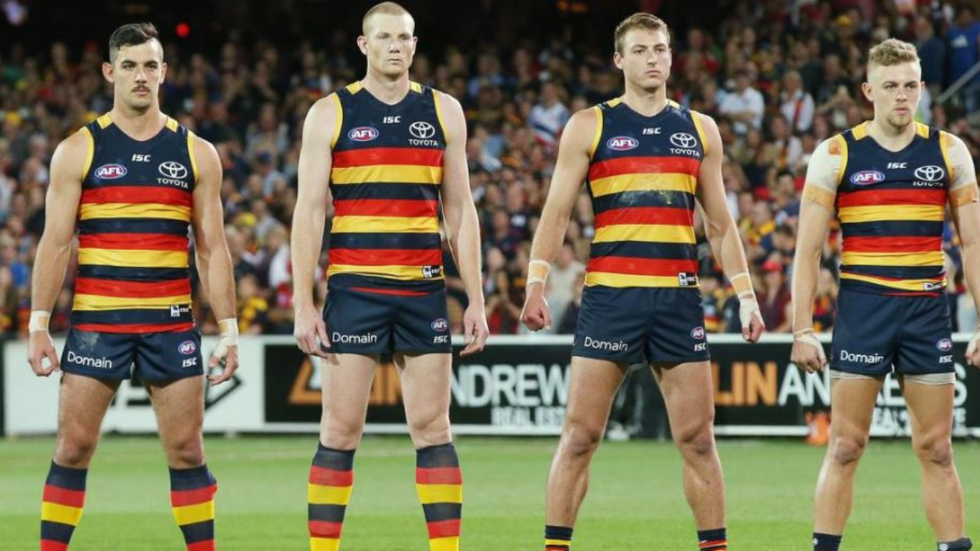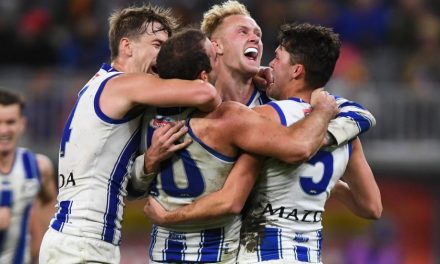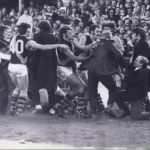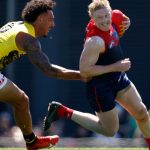Adelaide players adopt their “power stance” during the 2017 AFL finals series. Photo: AFL MEDIA
It seems incredible that we’re still talking about the infamous Adelaide pre-season training camp approaching five years since it took place. But the fact we are again following the release of Eddie Betts’ new autobiography “The Boy from Boomerang Crescent”, suggests several things.
One is that AFL football still has an unhealthily macho “secret men’s business” feel when it comes to building morale, which clearly in this case intimidated the participants from speaking out whilst they still had much to lose.
Another is that despite the lip service paid to welfare, brand protection still seems to matter a lot more to club and competition bosses than looking after the actual players who put on the show.
And the most damning is that despite the superficial appearance of a fully professional workplace, not only with all the employee rights and employer obligations that entails, but with social attitudes to match, the game in some quarters has some shockingly anachronistic views.
It’s not necessarily just a generational thing, either. Adelaide football director Mark Ricciuto played as recently as 2007, by when players had been full-time professionals for some time, yet has consistently failed to grasp the full significance of what occurred at the club, his response even on Wednesday that he hoped Betts was “getting over it”.
Footyology Podcast co-host Robert Shaw (who coached Ricciuto at Adelaide), in contrast hasn’t played since 1981.
Like many league footballers of the 1970s, he was subjected on occasion to all sorts of indignities, like, for example, being made to crawl around the Windy Hill boundary line along with his teammates by his Essendon coach Des Tuddenham one infamous Sunday morning following a bad loss in 1975.
Yet even Shaw was astonished by Betts’ account of that Adelaide camp. “You wouldn’t have got away with this in the ‘70s,” he said on this week’s episode discussing the story.
“If those claims are correct that private and confidential information was then used to expose players to humiliation and embarrassment, to try to bring out toughness and masculinity, then can we just call this what it is? Absolute bullshit.
“This was in 2018. We did some extraordinary things in the ‘70s and ‘80s, my goodness it was hard, but I never had a group come in and humiliate me.”
Whilst the cultural appropriation of which Betts writes is bad enough, this is about more than another example of the game paying lip service to Indigenous welfare without having the faintest clue what that actually entails. This is about treating anyone involved in the sport with some respect and dignity.
It remains a matter of some wonder that the AFL took no punitive action against Adelaide after finding “no violation of industry rules”, merely issuing some recommendations about “improved governance and compliance in relation to the protection of the players, officials and staff at the club”.
PLEASE HELP US CONTINUE TO THRIVE BY BECOMING AN OFFICIAL FOOTYOLOGY PATRON. JUST CLICK THIS LINK.
But what it can’t control is the damage this sordid episode does to the reputation of the game’s elite level competition.
Those either inside the bubble of AFL football or even outside but devotees of this sporting “religion” sometimes struggle to see it, but there are, believe it or not, many hundreds of thousands of “non-believers” who abhor the still-too-many examples of outdated toxic masculinity on or off the field which still occur.
The AFL can kiss goodbye the prospect of ever convincing them it runs a contemporary and inclusive game in which they, their children or partners can at a very minimum feel safe in the workplace and respected as human beings.
If there is a “punchline” of sorts to this saga, of course, and the definitive repudiation of the archaic sort of nonsense the people running this program were preaching, it comes in the results delivered. Which have been disastrous.
Adelaide was runner-up in 2017 after having finished on top of the ladder, playing a dynamic brand of football. In 2018, after the Gold Coast camp, it finished 12th. By the end of 2019, it had missed finals two seasons in a row and its coach Don Pyke had resigned, along with a score of staff involved.
The Crows are now in a third year of a complete rebuild under Matthew Nicks having finished last, 15th and currently 15th again. From a senior list of 45 players in 2017, just 11 remain.
There’s a fair argument this debacle has undone an entire club. There’s an interesting contrast to the Crows’ example, too, provided by Melbourne’s aborted pre-season camp in 2018, an episode which doesn’t attract nearly as much attention.
Melbourne players alarmed by their experience of a camp in 2017 involving sleep deprivation, torturous physical assignments and army-style rations, and in which players were injured, actually complained to the AFL Players’ Association before the follow-up, causing its cancellation.
That predictably, led to the Demons being roundly pilloried and ridiculed as “soft”, the more bone-headed elements of the AFL commentariat insisting the tail was wagging the dog, that Melbourne would now routinely be exploited by opponents, and surely didn’t have the mental fibre to go all the way.
All of which looks pretty stupid now given how Melbourne has performed over the last few years. Indeed, the Demons ended up in a preliminary final that very year.
It’s 2022, for heaven’s sake. The attempts to recreate these “Lord of the Flies” type scenarios in the name of building resilience and strength of character were bad enough 50 years ago, bordering on unthinkable now.
And the greatest irony? That Eddie Betts, the man who has finally blown the whistle on this shameful episode and the attempts to cover it up, has emerged having shown far more courage in doing so than anyone else involved.
This article first appeared at ESPN.












Absolutely spot on Rohan. That toxic masculinity continues unchecked with the farcical lack of review of the Preuss off the ball charge on Zach Merrett. The AFL’s lack of consistency is farcical.